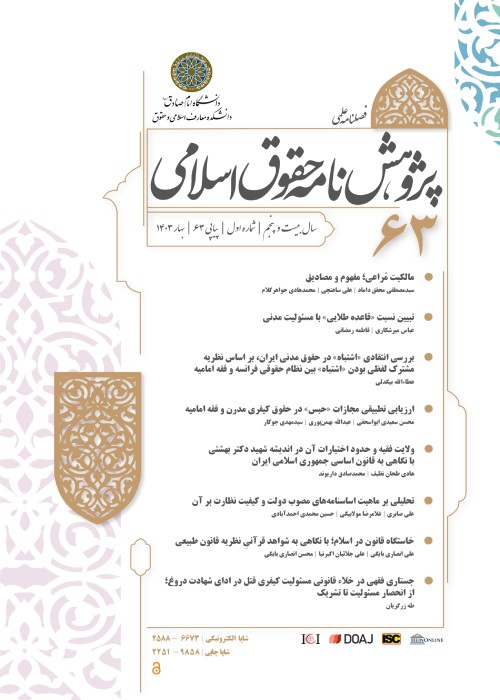Non-Establishment of Misrepresentation by Silence and Abstention from Disclosing Defects at the time of Making Contract: A Study in Imamiya Jurisprudence and Iranian Civil Law
Iranian Civil Code does not explicitly address the occurrence of misrepresentation by silence. According to Article 438 of this Act, those ‘Operations’ that lead to deception are generally considered as misrepresentation. Some legal scholars believe that deceptive operations are occurred by a commission of an act, or an omission. Others include intentional silence as a part of these Operations. A similar divergence exists among Imamiya jurists. Some argue that ‘concealing a defect‘ is established through actions that demonstrate the non-deficiency in the the subject matter of the contract. Others contend that, if there is an awareness as to the defect, then silence and abstention from disclosing the defect will amount to the concealment of the defect, and consequently ‘misrepresentation’. Most jurists base the religious ruling of silence and non-disclosure of defects on the principles of deception and misrepresentation. However, some others find it challenging to apply the customary concept of deception to silence, as deceit and fraud typically occurs by deceptive actions. Moreover, the existence of an intent to deceive and the bad faith of the silent party are not customarily proved. Particularly, what has been prohibited in narratives related to deception involves doing deceptive activities such as mixing the subject matter of the transaction with other things. This article critically examines and evaluates the above perspectives, concluding that the proponents of establishing misrepresentation by silence lack convincing reasons. Additionally, a careful examination of the theoretical foundations of their position reveals that relying on misrepresentation in the cases of silence lacks substantial support, but a jurisprudential reputation. Especially, the religious prohibition of silence and non-disclosure of defects have not been established before many Imamiya jurists. Ultimately, it became evident that the existence of the ‘option of defect’ as a ‘postural </span>ruling’ for silence and abstention from disclosing defects is acceptable in Imamiya jurisprudence.
- حق عضویت دریافتی صرف حمایت از نشریات عضو و نگهداری، تکمیل و توسعه مگیران میشود.
- پرداخت حق اشتراک و دانلود مقالات اجازه بازنشر آن در سایر رسانههای چاپی و دیجیتال را به کاربر نمیدهد.


